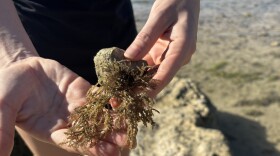The National Oceanic and Atmospheric Administration awarded the University of Hawaiʻi at Mānoa $210 million to create and fund a new Cooperative Institute for Marine and Atmospheric Research (CIMAR).
The funds will be awarded over five years, with the potential for a five-year renewal based on successful performance.
The Cooperative will continue research projects from the university and NOAA’s previous collaborative at the Joint Institute for Marine and Atmospheric Research (JIMAR).
It will also begin new research projects relating to ecosystem forecasting, ecosystem monitoring, ecosystem-based management, protection and restoration of resources, equatorial oceanography, climate research and impacts, tropical meteorology, and tsunami and other long-period ocean waves.
"The NOAA funds huge amounts of research on everything from fish, to coral, to waves interacting with the coastline, to erosion, atmospheric variability like the vog," said Doug Luther, the director of JIMAR. "Most of that research is oriented towards understanding the environment that we live in, and preferably getting us a good enough understanding that we can then manage the environment."
JIMAR will transfer to CIMAR beginning fiscal year 2022.




